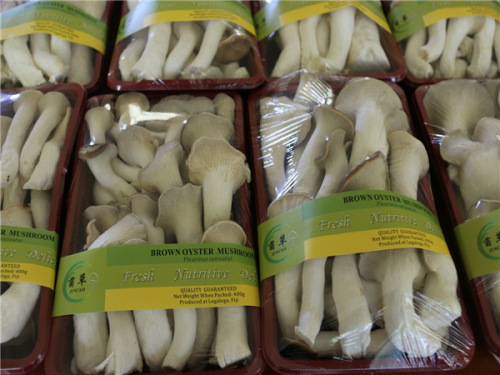
Mushrooms produced in Fuji with Chinese technology. (Photo/Xinhua)
Fiji could not produce edible or medicinal mushrooms in the past but that has become history.
A Chinese scientist has brought his technology from China to this tiny island country across the vast Pacific Ocean, gifting the Fijian people locally-grown mushrooms, and more importantly a brand new livelihood that lifts them further away from poverty.
When the China Aid Fiji Juncao Technology Cooperation Project managed to commercialize the Fijian-grown produce on the Pacific island country's domestic market for the first time in late 2014, Prof. Lin Zhanxi, project chief scientist from China's Fujian Agriculture and Forestry University who invented the Juncao technology in 1980s and is therefore nicknamed Papa Juncao, felt that all his efforts are worth it.
"I'm very glad to help Fiji with the emerging Juncao industry where thousands of households can participate, increasing incomes for both subsistence and bigger scale farmers, helping with poverty alleviation and promoting the friendly relationship between China and Fiji," Lin, 73, who shuttles between China, Fiji and other countries to take care of his Juncao projects, told Xinhua Wednesday via WeChat, a popular messaging app.
Nowadays, the project, in association with local mushroom farmers and distributors, regularly supplies Juncao mushrooms to a lot of hotels and restaurants across Fiji, said Lin.
The China Aid Fiji Juncao Technology Cooperation Project, established in 2014 after the Chinese and Fijian governments signed an agreement to start the agricultural cooperation, is aimed at helping Fiji initiate its Juncao industry, diversifying Fijians' menu, creating mushroom growing-related job opportunities, increasing local farmers' incomes and contributing to poverty alleviation in the Pacific island country.
Traditional edible and medicinal fungus cultivation techniques rely on logs or sawdust as the "soil" for mushrooms to grow from, while the technology of Juncao, a transliterated word meaning "fungus grass" in Chinese, enables mushrooms to grow out of chopped grass instead, therefore helping conserve woody plants or forests that the modern world is not really rich in.
Fiji's Ministry of Agriculture identified the Legalega Research Station at the country's tourism hub of Nadi as an ideal place to grow Juncao mushrooms taking into consideration the area of demonstration, marketing and product exportation.


















































